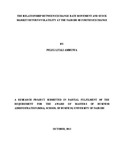| dc.description.abstract | Domestic currency depreciation makes local firms more competitive, leading to an increase in
their exports. This in turn raises their stock prices. A weak or no association between stock prices
and exchange rates can also be postulated. Transaction costs and sunk costs of market entry
imply that only large exchange rate movements affect market structure and, thereby, firms’
market value. Therefore, like prices of other assets the exchange rates are determined by
expected future exchange rates. Any news/factors that affect future values of exchange rate will
affect today’s exchange rate. This study set to establish the relationship between exchange rate
movement and stock market returns volatility at the Nairobi Securities Exchange.
The study adopted a quantitative design. The target population for this study included 56
companies quoted at the NSE as of December 2011. Since the population was small and the
study is using secondary data, the study conducted a census. The study used secondary data
collected from the Nairobi Securities Exchange and the Central bank of Kenya for the period
2007-2011. The study regressed stock market returns volatility against exchange rate movement.
From the regression output, the study established that exchange rate movements greatly affected
the stock market return volatility owing to its information content to the investors. With high
fluctuations in the exchange rates, the exchange rates movement became bigger accompanied by
a huge stock market return volatility. Study concludes that there is a strong relationship between
exchange rate movement and stock market returns volatility. This is especially carried through
the information content of exchange rate movement on the security’s business. The study
concludes that exchange rate movement also affects the stock market performance greatly
through its spiral effects. Through over macroeconomic variables, exchange rate movement
indicates the state of the economy hence the likely future state of the economy. These variables
would include things like interest rate and the money supply in the economy which has great
impact on the activity level of the security’s performance. The policy makers need to factor the
effects of exchange rate movement on the performance of the stock exchange. | en |

